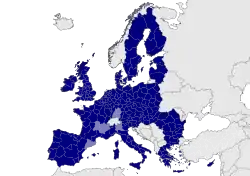Four Motors for Europe
The Four Motors for Europe is a transnational, interregional network of four highly industrialized and research-oriented regions in Europe. Rhône-Alpes of France, Baden-Württemberg of Germany, Catalonia of Spain and Lombardy of Italy signed an agreement of cooperation on September 9, 1988, in Stuttgart, Germany. The so-called Memorandum sets out to increase economic and social cooperation between the regions that do not possess a common border. The agreement was to have the four regions cooperate in a long term relationship in the fields of science, research, education, environment, culture, and other sectors. The purpose of this relationship was to foster the regional dimension within the European Union as well as increasing the potential for economic growth within the four regions. These regions focus on the exchange of information with each other to expand their technology and R&D. The group works selectively with associated partners.[1]


The Four Motors have since expanded to include Wales of the United Kingdom, Flanders of Belgium, Małopolska of Poland and Quebec of Canada (North American country) as associate members,[2] while Rhone-Alps merged with Auvergne in 2016, to create Auvergne-Rhône-Alpes.
References
- Loughlin, J. (1996). ""Europe of the Regions" and the Federalization of Europe". Publius. Oxford University Press. 26 (4): 141–162. doi:10.2307/3330775. JSTOR 3330775.
- "The Four Motors For Europe". Culture Department. Generalitat de Catalunya [Government of Catalonia]. Archived from the original on 2018-07-31.